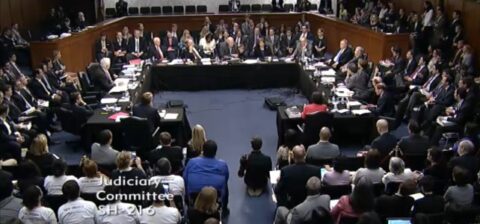Reform

Lessons from the Civil Rights Era for Immigration Reformers
On the 50th Anniversary of the historic “March on Washington” which led to some of the most significant legislative victories in the civil rights movement, it’s hard to not reflect on the influence that activists and legislators in the 1960’s have had and should have on the immigrant rights movement today. There are, in fact at least two very important takeaways for immigration reformers. First, the activists in the 60’s showed that the power was indeed in the hands of the people and flexing political muscle would pay off. Second, final passage of the 1964 Civil Rights Act demonstrated how strong political leaders can negotiate controversial bills and get them across the finish line. Read More

Two Steps Forward, One Step Back: The RNC on Immigration Reform
The Republican National Committee took two steps forward last week when they passed a resolution calling on Congress to get immigration reform done by year’s end, but took one step back by suggesting Congress offer legal status, but no path to citizenship for the currently undocumented population. This was followed by statements from Rep. Bob Goodlatte, Chairman of the House Judiciary Committee this week, who declared that he does not support a path to citizenship for DREAMers, and no immediate status for their parents. This illustrates just how much further the party has to go before it is in sync with a growing number of its own members—several of whom have just begun to declare their support for a path to citizenship —and the vast majority of the public, who support immigration reform and full citizenship for the undocumented. Read More

New Study Shows How Native-Born Workers Benefit from Immigration
One of the fears recurrently raised by those who oppose immigration is that inflows of immigrants negatively affect the native-born labor force in general, and less-educated working class individuals in particular. The idea upon which this assertion relies is that when less-educated workers immigrate into the host country, they systematically bring down the wages of similarly educated native-born workers. This notion is oftentimes overstated and is to a large extent fueled by prejudice rather than being backed by hard evidence. Read More

Turning up the Heat on Congress Over Summer Recess
August recess is in full swing, and the plans to show Congress how badly Americans want immigration reform “back home” are well under way. While August is always a time to remind Members of Congress about crucial issues, this year’s immigration events, meetings, and rallies are occurring at a time when Members of Congress, particularly House Republicans, are seriously re-examining their positions on immigration. This may be the most critical month for capturing the hearts and minds of House Members. Read More

How to Have Productive Conversations on Immigration
In preparation for the August recess, the Immigration Policy Center released a new guide to answering the tough questions on immigration. This is perhaps a misnomer, as the issues we cover—the intersection of crime, the economy, integration, and immigration—aren’t so much tough as they are complicated. There is plenty of evidence available on the significant contributions immigrants make to the country, so providing that is easy. What’s tough is discussing the personal myths and misconceptions individuals carry with them on the topic. Aren’t immigrants to blame for…? Read More

The Immigration Debate Could Use a Healthy Dose of Facts
Immigration is sure to be a hot topic when Members of Congress meet their constituents face-to-face during the upcoming summer recess. The full Senate has passed a comprehensive immigration reform bill that includes a controversial “border surge” as well as a path to citizenship for unauthorized immigrants already living in the United States; the House Committee on Homeland Security has passed an enforcement-only border bill that doesn’t even acknowledge the other components of immigration reform; and there continues to be much heated public debate about what the House will do next and whether the reform effort will survive the vagaries of partisan politics. As politicians and voters attempt to wade through all of the thorny issues that are raised by the topic of immigration reform, and as journalists attempt to report on these many complex issues, there is something which should be kept front and center: facts. Read More

Steve King’s Tall Tales About Immigrants and Crime Don’t Add Up
There is no denying that Rep. Steve King (R-IA) has a vivid imagination. As he sits in Border Patrol vehicles at night, he apparently sees hundreds of DREAM Act-eligible drug mules with muscular calves hauling heavy loads of marijuana across the border. How does he know these drug mules would meet the rather stringent criteria for legalization under the DREAM Act? Hard to say. How does he know these drug mules outnumber their valedictorian counterparts by a ratio of one hundred to one? No one can say. What is certain is this: when it comes to the topic of immigration and crime, nativists like King have no need for facts when there is so much fear and innuendo at their disposal. Perhaps this is because the facts are so stacked against them. Read More

Immigration Reform an Imperative for Cities and Metropolitan Areas
Metropolitan leaders from around the country made the case for immigration reform at an event hosted by the Brookings Institution’s Metropolitan Policy Program today. Over 80 percent of the U.S. population, including 95 percent of immigrants, now live in metropolitan areas; cities and towns across the country therefore have a huge stake in passing immigration reform. In fact, panelists agreed that comprehensive immigration reform is an imperative for metropolitan areas. “We need an immigration system that is keeping with the times,” stated Audrey Singer, a Senior Fellow with Brookings. Read More

Medicare’s Health and Well-Being Depends on Immigrants
Immigrants’ access to affordable health care is one of the most contested issues in the current immigration reform debate. Most advocates of comprehensive immigration reform point to the need to ensure that aspiring citizens have opportunities to access appropriate health care since such access will impact their ability to learn, to work, and to contribute to their communities. On the other end of the spectrum, anti-immigration groups tend to inaccurately emphasize that newly legalized immigrants would represent an excessive fiscal burden. This prediction is based on a misleading characterization of immigrants as “takers”—in other words, as disproportionate consumers of public resources. Several studies have shown that this is just not the case. In fact, non-citizens use public benefit programs at a lower rate than similar low-income native-born citizens. With regard to medical expenditures in particular, immigrants tend to use less health care than their U.S.-born counterparts. Read More

What Does the Success of the Mark-Up Tell us About the Coming Full Senate Vote on Immigration?
One year ago, with the presidential race in full swing and proponents of self-deportation making the headlines, it would have been difficult to predict the extraordinary vote that took place Tuesday in the Senate Judiciary Committee. Ten Democrats and three Republicans voted to pass S. 744 out of committee and send a comprehensive immigration bill to the Senate floor. This could never have happened without the overwhelming support for immigration reform that the public has shown, particularly since the November 2012 election. Even with that support, however, there was no guarantee that the long, slow process of negotiating and drafting a bipartisan bill that could succeed in committee (and then the Senate floor) would ever come to fruition. And once a bill is introduced, getting it through committee requires a mix of political acumen to keep the bill alive. Read More
Make a contribution
Make a direct impact on the lives of immigrants.
